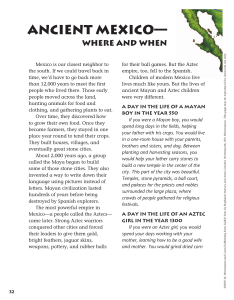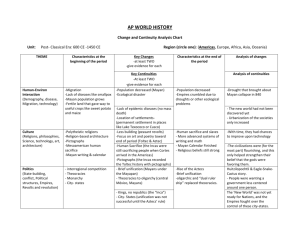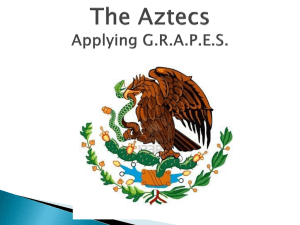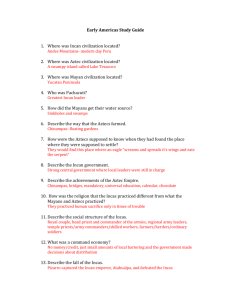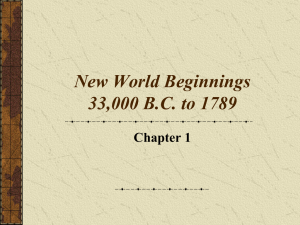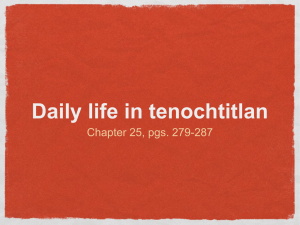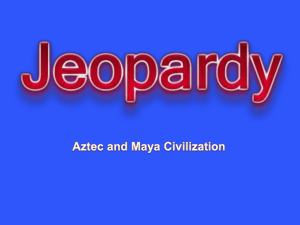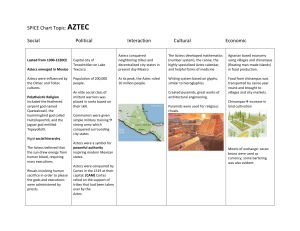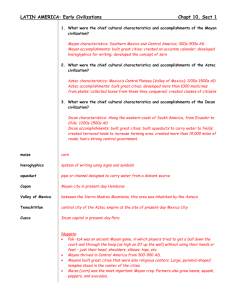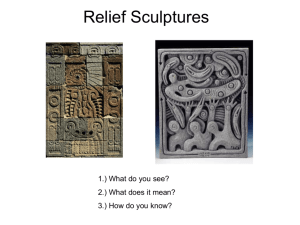timetable the toltecs the warlike aztecs appeasing the gods the fall of
advertisement
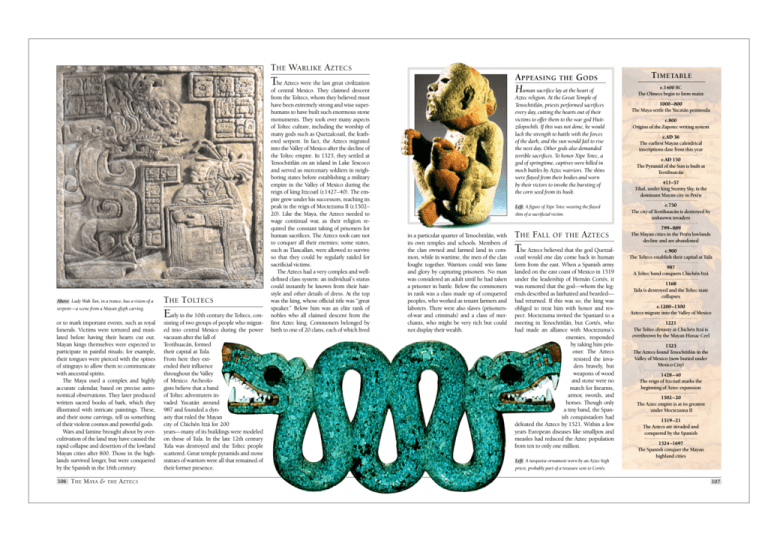
T HE WARLIKE A ZTECS A PPEASING The Aztecs were the last great civilization Above Lady Wak Tun, in a trance, has a vision of a serpent—a scene from a Mayan glyph carving. or to mark important events, such as royal funerals. Victims were tortured and mutilated before having their hearts cut out. Mayan kings themselves were expected to participate in painful rituals; for example, their tongues were pierced with the spines of stingrays to allow them to communicate with ancestral spirits. The Maya used a complex and highly accurate calendar, based on precise astronomical observations. They later produced written sacred books of bark, which they illustrated with intricate paintings. These, and their stone carvings, tell us something of their violent cosmos and powerful gods. Wars and famine brought about by overcultivation of the land may have caused the rapid collapse and desertion of the lowland Mayan cities after 800. Those in the highlands survived longer, but were conquered by the Spanish in the 16th century. 106 T HE M AYA & THE A ZTECS T HE T OLTECS E arly in the 10th century the Toltecs, consisting of two groups of people who migrated into central Mexico during the power vacuum after the fall of Teotihuacán, formed their capital at Tula. From here they extended their influence throughout the Valley of Mexico. Archeologists believe that a band of Toltec adventurers invaded Yucatán around 987 and founded a dynasty that ruled the Mayan city of Chichén Itzá for 200 years—many of its buildings were modeled on those of Tula. In the late 12th century Tula was destroyed and the Toltec people scattered. Great temple pyramids and stone statues of warriors were all that remained of their former presence. of central Mexico. They claimed descent from the Toltecs, whom they believed must have been extremely strong and wise superhumans to have built such enormous stone monuments. They took over many aspects of Toltec culture, including the worship of many gods such as Quetzalcoatl, the feathered serpent. In fact, the Aztecs migrated into the Valley of Mexico after the decline of the Toltec empire. In 1325, they settled at Tenochtitlán on an island in Lake Texcoco and served as mercenary soldiers in neighboring states before establishing a military empire in the Valley of Mexico during the reign of king Itzcoatl (r.1427–40). The empire grew under his successors, reaching its peak in the reign of Moctezuma II (r.1502– 20). Like the Maya, the Aztecs needed to wage continual war, as their religion required the constant taking of prisoners for human sacrifices. The Aztecs took care not to conquer all their enemies; some states, such as Tlaxcallan, were allowed to survive so that they could be regularly raided for sacrificial victims. The Aztecs had a very complex and welldefined class system: an individual’s status could instantly be known from their hairstyle and other details of dress. At the top was the king, whose official title was “great speaker.” Below him was an elite rank of nobles who all claimed descent from the first Aztec king. Commoners belonged by birth to one of 20 clans, each of which lived THE G ODS Human sacrifice lay at the heart of Aztec religion. At the Great Temple of Tenochtitlán, priests performed sacrifices every day, cutting the hearts out of their victims to offer them to the war god Huitzilopochtli. If this was not done, he would lack the strength to battle with the forces of the dark, and the sun would fail to rise the next day. Other gods also demanded terrible sacrifices. To honor Xipe Totec, a god of springtime, captives were killed in mock battles by Aztec warriors. The skins were flayed from their bodies and worn by their victors to invoke the bursting of the corn seed from its husk. in a particular quarter of Tenochtitlán, with its own temples and schools. Members of the clan owned and farmed land in common, while in wartime, the men of the clan fought together. Warriors could win fame and glory by capturing prisoners. No man was considered an adult until he had taken a prisoner in battle. Below the commoners in rank was a class made up of conquered peoples, who worked as tenant farmers and laborers. There were also slaves (prisonersof-war and criminals) and a class of merchants, who might be very rich but could not display their wealth. T IMETABLE c.1400 BC The Olmecs begin to farm maize 1000–800 The Maya settle the Yucatán peninsula c.800 Origins of the Zapotec writing system c.AD 36 The earliest Mayan calendrical inscriptions date from this year c.AD 150 The Pyramid of the Sun is built at Teotihuacán 411–57 Tikal, under king Stormy Sky, is the dominant Mayan city in Petén Left A figure of Xipe Totec wearing the flayed skin of a sacrificial victim. c.750 The city of Teotihuacán is destroyed by unknown invaders T HE FALL 799–889 The Mayan cities in the Petén lowlands decline and are abandoned OF THE A ZTECS T he Aztecs believed that the god Quetzalcoatl would one day come back in human form from the east. When a Spanish army landed on the east coast of Mexico in 1519 under the leadership of Hernán Cortés, it was rumored that the god—whom the legends described as fairhaired and bearded— had returned. If this was so, the king was obliged to treat him with honor and respect. Moctezuma invited the Spaniard to a meeting in Tenochtitlán, but Cortés, who had made an alliance with Moctezuma’s enemies, responded by taking him prisoner. The Aztecs resisted the invaders bravely, but weapons of wood and stone were no match for firearms, armor, swords, and horses. Though only a tiny band, the Spanish conquistadors had defeated the Aztecs by 1521. Within a few years European diseases like smallpox and measles had reduced the Aztec population from ten to only one million. Left A turquoise ornament worn by an Aztec high priest, probably part of a treasure sent to Cortés. c.900 The Toltecs establish their capital at Tula 987 A Toltec band conquers Chichén Itzá 1168 Tula is destroyed and the Toltec state collapses c.1200–1300 Aztecs migrate into the Valley of Mexico 1221 The Toltec dynasty at Chichén Itzá is overthrown by the Mayan Hunac Ceel 1325 The Aztecs found Tenochtitlán in the Valley of Mexico (now buried under Mexico City) 1428–40 The reign of Itzcóatl marks the beginning of Aztec expansion 1502–20 The Aztec empire is at its greatest under Moctezuma II 1519–21 The Aztecs are invaded and conquered by the Spanish 1524–1697 The Spanish conquer the Mayan highland cities 107
